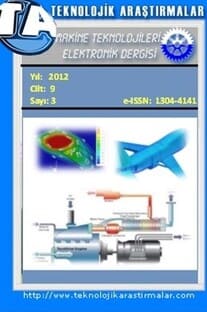Bir dizel motorunda ayçiçeği metil esteri kullanımının motor performans ve emisyonlarına etkisi
The effects on engine performance and emissions usage of the sunflower methyl ester at a diesel engine
___
- 1. Sayın C. Uslu K., Çanakçı M., Gümüs M, 2008,“Çift yakıtlı (etanol+dizel) bir dizel motorunda püskürtme avansının azaltılmasının motor performansı ve emisyonlarına etkisi”, 10. Uluslararası Yanma Sempozyumu, 198-205.
- 2. Çevik, İ., Bulut, C., Karabektas, M., Ergen,G., 2008, “Atık Bitkisel Yağdan Üretilen Biyodizel Yakıtının Ek Hava Uygulaması Yapılan Bir Dizel Motor Performansına Etkileri”, 10. Uluslararası Yanma Sempozyumu, 301-307.
- 3. Crabbe, E., Nolasco-Hipolito, C., Kobayashi, G., Sonomoto, K., Ishizaki, A., 2001, “Biodiesel production from crude palm oil and evaluation of butanol extraction and fuel properties”, Process Biochemistry 37, 65–71.
- 4. Pramanik K., 2003, “Properties and use of jatropha curcas oil and diesel fuel blends in compression ignition Engine ”, Renewable Energy, 28, 239–248.
- 5. Ramadhas A.S., Jayaraj S., Muraleedharan C., 2004, “Use of vegettable oils as I.C. engine fuels- A review”, Renewable Energy, 29, 727–742.
- 6. Karabektas, M., Ergen,G., 2008, “Biyodizel Yakıt Kullanılan Bir Dizel Motorunda Isı Balansı Uygulaması”, 10. Uluslararası Yanma Sempozyumu, 424-429.
- 7. Fukuda H., Kondo A., Noda H., 2001, “Biodiesel Fuel Production by transesterification of Oils”, Journal Of Bioscience And Bioengineering, 92, ,405-416.
- 8. Chuang-Wei, Chıu., 2004, “Biodiesel synthesis and impact of cold flow additives” Master thesis, University of Missouri-Columbia.
- 9. Raheman, H., Phadatare, A.G., 2004, “Diesel engine emissions and performance from blends of karanja methyl ester and diesel”, Biomass and Bioenergy, 27, 393 – 397.
- 10. Leung, D.Y.C., Guo, Y., 2006, “Transesterification of neat and used frying oil: Optimization for biodiesel production”, Fuel Processing Technology, 87, 883–890.
- 11. Yücesu H.S., Altın R., Çetinkaya S., 2001, “Dizel Motorlarında alternatif yakıt olarak bitkisel yağ kullanımının deneysel incelenmesi”, Turk J. Engin. Environ. Sci., 25, 39-49.
- 12. Kaplan C., Arslan R. and Sürmen A., 2006,“Performance Characteristics of Sunflower Methyl Esters as Biodiesel”, Energy Sources, Part A, 28:751–755.
- 13. Rakopoulos C.D., Rakopoulos D.C., Hountalas D.T., Giakoumis E.G., Andritsakis E.C., 2008, “Performance and emissions of bus engine using blends of diesel fuel with bio-diesel of sunflower or cottonseed oils derived from Greek feedstock”, Fuel 87, 147–157.
- 14. Keskin, A., Gürü, M., Altıparmak, D., 2007, “Tall Yağı Biyodizelinin Dizel Yakıtı ile %90 Oranındaki Karısımının Alternatif Dizel Yakıtı Olarak incelenmesi”, Gazi Üniv. Müh. Mim. Fak. Der., 22(1), 57-63,
- 15. Lue Y.-F., Yeh Y.-Y. and Wu C.H., 2001, “The emission characteristics of a small D.I. Diesel engine using biodiesel blended fuels”, J. Envıron. Scı. Health, 36(5), 845–859.
- 16. Usta N., 2005, “An experimental study on performance and exhaust emissions of a diesel engine fuelled with tobacco seed oil methyl ester”, Energy Conversion and Management, 46(15-16), 2373-2386.
- 17. Monyem, A., Van Gerpen, J.H., 2001, “The Effect of Biodiesel Oxidation on Engine Performance and Emissions”, Biomass and Bioenergy, Vol.20, 317-325.
- 18. Usta N., Öztürk E., Can Ö., Conkur E.S., Nas S., Çon A.H., Can A.Ç., Topcu M., 2005, “Combustion of biodiesel fuel produced from hazelnut soapstock/waste sunflower oil mixture in a Diesel engine”, Energy Conversion and Management, 46(5), 741-755.
- 19. Nwafor OMI., 2004, “Emission characteristics of diesel engine operating on rapeseed methyl ester”, Renewable Energy, 29(1), 119-129.
- 20. Özsezen A. N. ve Çanakçı M., 2008, “Atık kızartma yağından elde edilen metil esterin ön yanma odalı bir dizel motorda kullanımının performans ve emisyonlara etkisinin incelenmesi”, Gazi Üniv. Müh. Mim. Fak. Der., Cilt 23, No 2, 395-404.
- 21. Agarwal D., Kumar L., Kumar Agarwal A., 2008, “Performance evaluation of a vegetable oil fuelled compression ignition engine”, Renewable Energy, 33, 1147-1156.
- ISSN: 1304-4141
- Yayın Aralığı: Yılda 5 Sayı
- Başlangıç: 2004
- Yayıncı: -
Kural tabanlı karar verme mekanizmasına sahip sistematik araç seçim modeli geliştirilmesi
MUSTAFA BOZDEMİR, İLKER TURGUT YILMAZ
Açılı tip toplayıcıya sahip havalı güneş kollektörü ile iç ortam ısıtılması
Bir dizel motorunda ayçiçeği metil esteri kullanımının motor performans ve emisyonlarına etkisi
İLKER SUGÖZÜ, Fatih AKSOY, ŞÜKRÜ AYHAN BAYDIR
Periyodik aşırı yüklerin 2024-Al alaşımında yorulma çatlak ilerleme hızına etkisi
Üniform yayılı yüke maruz ahşap kompozit kirişlerdeki çökmelerin hesabı
ÜMRAN ESENDEMİR, Melek USAL, MUSTAFA REŞİT USAL
Buji ile ateşlemeli bir motorun silindirinin sonlu elemanlar yöntemi ile tasarımı
MELİH OKUR, Selim ÇETİNKAYA, FATİH ŞAHİN, Tolga TOPGÜL
Isı pompası ve kombi ısıtma sistemleri maliyet analizlerinin karşılaştırılması
Ruppert hız mekanizmalarında optimum dişli çark boyutlandırılması için yapay sinir ağları kullanımı
